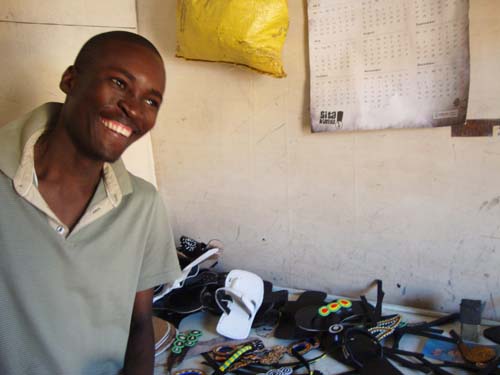
Day 2 of our Nairobi shopping research project:
When you visit the curio shops at the craft markets in Nairobi, most of the vendors aren’t the ones actually making the products. They source them from all over Nairobi and Kenya, but I heard several people mention Kibera. Kibera has a lot of people (I put this vaguely because some sources say 170,000 while others say 1 million or more) so just asking around about crafts people could take some time. While I did visit Power Women the previous day, I wanted to visit more artisans. The question was, how to go about this…
Slum Tourism
Slum tourism is complicated. And truth be told, I go back and forth on how I feel about it. The idea of a bunch of muzungus parading around a slum, snapping photos of people like they live in a zoo is perhaps my worst nightmare. I can only hope it doesn’t happen that way. But if people end up purchasing goods within the community, then it’s definitely a benefit to the people. When I visited Nomonde’s restaurant in Cape Town, I would say that it is similar to slum tourism and it never hurts to educate oneself and interact with other people. Perhaps that is the solution- to engage.
I read a review about Explore Kibera Tours and decided to contact them on Day 1 to ask about a custom tour to visit crafts people. They “offer safe walking tours for open-minded travelers and aims to solely benefit Kibera by hiring local staff, supporting local development projects, and bringing a stream of demand to local craft makers.” The following day John and I met up with our guide Fred in front of the Nakumatt supermarket within walking distance to Kibera. I explained my interests to Fred and learned that he is currently a university student living in Kibera and works as a tour guide part-time. He took us to four different craftspeople, but two of them stuck out in particular.
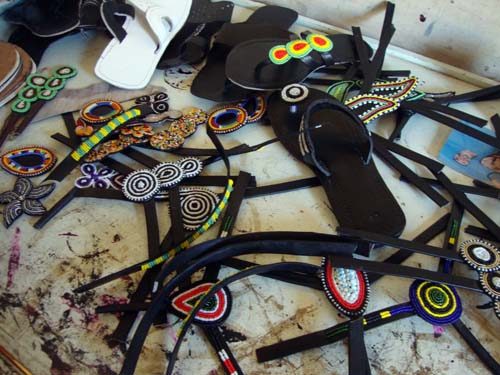
Msafari Leather Works
The first is a man named Baraka who is head of a group called Msafiri (translation: ‘traveler’… love it already). His group has 12 boys and 3 girls in it and they started with trash collection in Kibera. From there, they started a car wash and eventually went on to make leather and beaded sandals on order. These sandals are very popular in Kenya, but I expressed my surprise to find someone making them in Kibera. Most of these sandals are made in Malindi or Mombasa on the coast and shipped up to Nairobi. Baraka smiled; he’s from Malindi and taught the craft to the other members of the group. The workshop is no larger than a 5’ x 8’ space, and actually John and I had passed right by it the day before when we walked around. I never would have guessed that they were crafting these beautiful shoes in this tiny little shop. The toxic smell of the glue is hard to miss and I whispered to John that it’s probably killing the ozone. I ask Baraka to see a completed sandal, and when I inspect it closely, I notice that it has a stamped pattern along the stitching on the sole. I ask him how he makes it and he pulled out a small number stamp set. I laughed. I look at the sandal again and see the number ‘7” repeated. And on other shoes is the number “1” or the number “5”. Like the smell of the black tar-looking glue, Baraka’s smile is also hard to miss. He pulls out his ‘portfolio’ (a stack of photos) and shows me many different designs and colors. They really are beautiful.
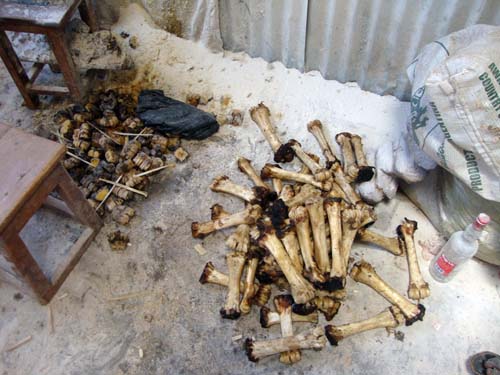
Victorious Youth Group
The final shop that Fred took us to was probably the most exciting. It is a bone bead business that has 25 employees, is the supplier to women’s craft groups in Kibera, and sources their raw materials (cow, camel, and goat bones) from butchers within Kibera. While Victorious Youth Group does make some of their own bone jewelry and accessories (to sell to people like me who stop by their workshop), they sell most of their beads to other craftspeople to create their own pieces. Though I asked plenty of questions about operations, pay, working conditions, etc, John asked only one question: “Do you train people in the craft?” The group told us they were currently training four people….for free! They said if a person can afford to pay, they will, but otherwise they will train others for free. We asked about the risk of creating competition, and they simply said they want to help others find employment and that the group is confident in their own creative abilities to stay one step ahead. They also hope that the person they train might try to sell elsewhere and therefore, not create competition. Yes, I was impressed.
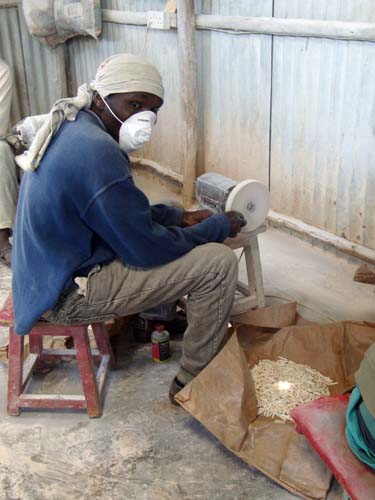
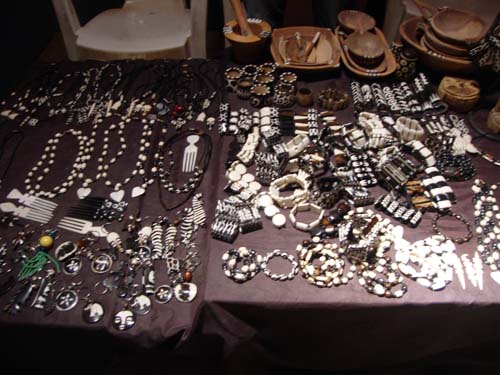
The tour through Explore Kibera was only 500 Ksh per person (about $6). If you are in Nairobi and curious to see Kibera, I highly recommend them.
I would LOVE several pairs of those shoes! They are gorgeous!!!
Baraka *does* have a great smile!
I’m so happy you’re spending your time doing what you hoped to do. Can’t wait to hear about ideas that emerge on this trip for work/projects!
The finished product is so beautiful It’s amazing how they do it.
The sandals look awesome, like they would be very expensive in America. haha
I will never know how to feel about slum tourism. I felt SO so beyond awkward when we were brought to a village in the Amazon while we were on a boat trip there. I feel like it really dehumanizes people when you go and take pictures and don’t interact at all…but that being said, it can be an enriching experience if you try to go out of your comfort zone and actually talk to the people…if they are open to it too.
Hi Kyle,
I can tell you that most of the people in Kibera like when visitors come. They think it is an honor. Pictures are welcome by some you just have to ask or pay them a few Kenyan Shilling which would be less that 1 US Dollar. I say step out your comfort zone and enjoy the people.
I do not believe in paying for photos, however I wholeheartedly think that travelers should interact with locals and experience something new!
The thing that strikes me the most is this man’s smile!
I was so pleased to see you showcase these awesome artisans in Kibera. I am working with some there myself which includes the Victorious bones people that you have here. The sandals can be purchased on ETSY at http://www.etsy.com/shop/BAttitudes?ref=si_shop. They are made in Kibera by my fiance and a few others. Keep traveling the world and sharing their stories!